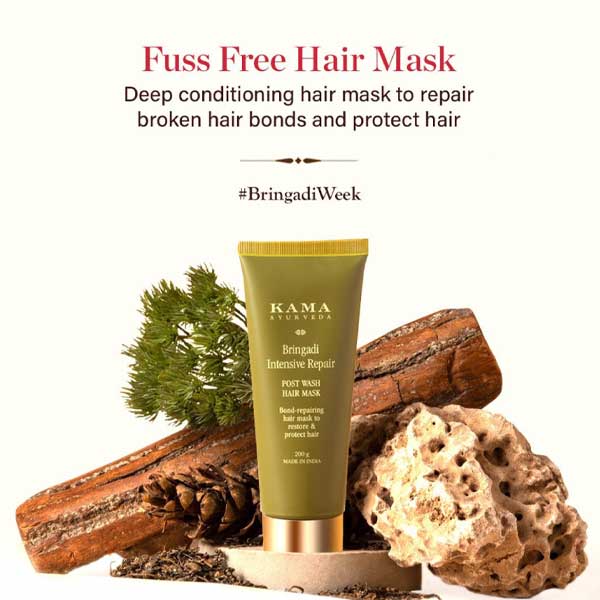While the monsoons are a refreshing respite from the scorching heat, they come with their own set of challenges for your cherished locks. The damp weather can introduce a host of hair and scalp concerns. Wondering how to tackle them?
Dive into this article for a comprehensive monsoon hair care guide, ensuring your tresses remain gorgeous as ever.
How To Take Care Of Hair In Monsoon?
From an oily, greasy scalp to the persistent itchiness and dandruff, the rainy season can be quite a challenge for your tresses. Left unchecked, these issues can escalate, leading to weakened roots and significant hair loss, a condition often referred to as monsoon hair fall.
But fret not! We've compiled ten tips for the monsoon that will help you navigate the season stress-free.
1. Eat a Nutritious, Balanced Diet:
The health of your hair largely reflects your internal health. A nutrient-rich diet can fortify hair strands from the roots and provide them with the strength to withstand humidity and rain.
While rain might tempt you towards hot and crispy treats, indulging can worsen hair and scalp issues. Opt for a fresh, healthy diet over junk food to protect your locks.
What experts say -
“Incorporate proteins from sources like eggs and legumes. Omega-3 fatty acids from walnuts and flaxseeds also boost hair health. Make sure to consume a good mix of vitamins from fruits and green vegetables. Biotin, found in nuts and bananas, is particularly beneficial for hair.” - Dr. Vinny Narayanan

2. Keep Your Hair Dry:
Excessive moisture can weaken hair roots and cause breakage. It also provides a breeding ground for fungus and bacteria leading to scalp issues. Not only this, your hair is brittle and the weakest when wet.
Hence, it’s recommended to always dry your hair gently after a wash, preferably letting it air-dry.
3. Hair Spa And Conditioning Treatments:
Monsoons can dehydrate hair with frequent rain and washes. The increased humidity can make your hair look frizzy and lifeless. Hair spa and conditioning treatments can restore this lost moisture. Opt for monthly hair spa treatments targeting hair fall for root strength and length protection.
At home, use deep-conditioning hair masks once a week to restore the essential moisture, and impart a healthy shine to your hair. We recommend Bringadi Intensive Repair Post Wash Hair Mask with ingredients Bhringraj (King Of Herbs), Coconut Milk (natural conditioner) and Amla (a powerhouse of Vitamin C) to add resilience to hair.

4. Opt for a Suitable Hairstyle/Haircut:
The right hairstyle and haircut can reduce the impact of humidity and prevent hair tangling. Shorter haircuts like bobs or layered styles can be easier to manage and prevent excess moisture from settling in your scalp and locks.

What experts say -
“Even simply trimming your hair will help get rid of split ends that could lead to extra frizziness in monsoon. For those with longer hair, braids, buns, or loose ponytails can help in keeping hair tangle-free.” - Dr Gopan G\
5. Avoid Hair Colour And Heat Styling:
The monsoon demands a change in your hair care tactics to counteract the excess moisture and potential damage. This is not the best time to colour or style your hair. So avoid any kind of chemical hair treatments and heat.
6. Oil Your Hair:
Oiling nourishes the scalp, strengthens hair roots, and provides a protective layer against external damage. They also fight scalp infections that can occur in the rainy season.
Opt for natural oils like Coconut, Almond, or Olive oil. Warm the oil slightly and massage it into the scalp. Leave it on for an hour or overnight before washing.
We recommend Bringadi Intensive Hair Treatment Oil that is clinically proven to prevent dandruff and hairfall.

7. Wash off Rainwater:
Rainwater, though seemingly clean, can contain pollutants that can weaken and damage your hair. If your hair gets wet in the rain, rinse it with clean water once you're indoors. Rainwater's acidity can mess with your scalp's pH, leading to hair problems. Washing your hair will also remove any potential contaminants.
What experts say -“If it’s not possible to wash your hair quickly, make sure to dry your hair using a soft microfiber towel that absorbs water rapidly. Microfiber towels cause less friction and prevent hair fall.” - Dr Kanchan Kachroo
8. Comb Wisely:
Wet hair is more prone to breakage. Choosing the right comb and using the right combing technique can help prevent unnecessary damage.
Choose a comb with spaced-out teeth to minimize hair breakage. Always comb gently, starting from the ends and working your way up to the roots.
Remember to wait for your hair to dry before combing, and during monsoon, don't share combs to avoid fungal risks.
9. Using the Right Shampoo and Conditioners:
The right products can counteract the damaging effects of humidity and moisture during the monsoon. Opt for sulphate and paraben free shampoos that are hydrating yet mild.
For conditioners, ingredients like Coconut Milk can be beneficial in retaining hair moisture. We recommend Bringadi Hair Conditioner, an Ayurveda based formula to mitigate damage caused by the environment.

10. Watch Out for Dandruff:
The monsoon season can exacerbate dandruff due to increased humidity and scalp wetness.
Natural remedies, such as Neem oil, Lemon juice, Tea tree oil can be effective. Dilute equal parts (50/50) of Neem Oil with Sweet Almond Oil or Sesame Oil and gently massage into the scalp. Allow it to work for 30 minutes. Rinse off to get rid of dandruff naturally.

Why Does Hair Fall Occur In Monsoon?
The primary reason is the high moisture content in the air. This increased humidity not only weakens hair shafts, causing them to break more easily.
This same humidity provides the perfect setting for fungal and bacterial infections on the scalp, which further weakens the roots and increases hair loss. Damp scalp makes for a breeding ground for microorganisms, further exacerbating conditions like dandruff and increasing hair loss.
Sweat mingling with rainwater also results in a build-up of dirt on the scalp, clogging follicles and causing hair to fall out. Sometimes, the very water we use to wash our hair changes its pH during monsoons. This imbalance can be another culprit behind increased hair fall.
How Much Hair Fall Is Normal During the Rainy Season?
According to several experts, there can be a surge of up to 30% in hair fall during monsoons. This means that, influenced by the monsoon weather conditions, an individual might experience a loss of up to 150 hair strands a day.
Such an increase can be attributed to the high moisture content in the air, the scalp's reaction to this damp environment, and other related factors.
That said, it's essential not to panic. Under typical circumstances, everyone undergoes a regular hair cycle that consists of growth, resting, and shedding phases. It's completely normal to lose between 50 to 100 hair strands daily, as they are naturally replaced in a person with a healthy hair cycle.
Simply caring for your hair during this season and addressing any arising issues can substantially diminish hair fall.
Monsoon Hair Care Tips Based On Your Hair Type
Monsoon brings with it unique challenges, and depending on your hair type, your care regimen will vary. Here's a tailored guide to cater to specific hair concerns during the rainy season:
Oily Hair:
- Shampooing: Opt for a mild, balancing shampoo to prevent over-stripping of natural oils, which can cause the scalp to produce even more oil. Remember to shampoo on alternate days to control scalp sebum and excess oil.
- Conditioning: Focus on the lengths and ends. Avoid applying conditioner directly to the scalp.
- Drying: Air-dry when possible to avoid overstimulating oil production.
- Styling Tips: Keep your hair up in a braid to minimize frizz and reduce contact with rainwater. Avoid touching your hair frequently as it can lead to more oiliness.
Dry Hair:
- Hydration: Use a hydrating shampoo and conditioner. A weekly deep-conditioning mask can restore moisture.
- Protection: Use hair serums or oils, like Argan or Coconut, to lock in moisture. When out and about, wear a waterproof hat or scarf to shield your hair from rainwater.
- Avoid: Minimize the use of heat-styling tools.
Fine Hair:
- Volume: Opt for volumizing shampoos and conditioners.
- Conditioning: Use lightweight conditioners to avoid weighing hair down.
- Styling: Minimal product is key. Too much can make fine hair go limp. Use light mists or sprays for hold.\
Frizzy Hair:
- Smoothing: Use products formulated to combat frizz, like smoothing shampoos, conditioners, and serums.
- Deep Conditioning: Incorporate a weekly treatment to hydrate and manage frizz. Herbal shampoos and nourishing hair masks are excellent for this season.
- Styling: Avoid heat styling. If necessary, use a heat protectant spray.
- Drying: Pat dry gently and avoid rubbing. Swap your regular towel for a microfiber one or a soft T-shirt. This prevents hair cuticles from roughing up.
Itchy Scalp:
- Shampooing: Opt for a mild, sulfate-free shampoo. Overwashing can aggravate an itchy scalp.
- Treatment: Consider natural remedies like Aloe vera gel or Tea tree oil to soothe the itch.
- Avoid: Limit the use of styling products which can cause build-up and worsen itchiness.
Dandruff Prone Hair:
- Shampooing: Use an anti-dandruff shampoo, alternating with your regular one.
- Scalp Care: Keep the scalp dry. Wetness can exacerbate dandruff.
- Natural Remedies: Neem, lemon, and fenugreek are known to help combat dandruff.
FAQs
Should I oil my hair in monsoon?
Yes, oiling provides nourishment to the hair and scalp. However, avoid heavy oiling. Instead, opt for a light massage with oils like coconut or almond to maintain moisture and combat dryness.
How do I stop my monsoon frizzy hair?
Post-washing, consider applying anti-frizz serums or leave-in conditioners to tame the unruliness. When drying, remember to be gentle; avoid rubbing your hair vigorously with a towel. Instead, pat dry or switch to a microfiber towel. Weekly deep-conditioning masks can also provide an added layer of protection. Also, avoid heat styling as much as possible.
How many times should we wash our hair in monsoon?
Ideally, you should wash your hair 2-3 times a week. Due to the high humidity, sweat, and dirt accumulation can be more; however, over-washing can strip the hair of its natural oils.
What should you apply to your hair during the monsoon?
Apply lightweight serums and conditioners tailored for humid conditions. Use mild shampoos, preferably those with antifungal properties if dandruff is a concern. Hair masks rich in natural ingredients, like Aloe Vera or Tea Tree oil, can also be beneficial.
Should I wash my hair daily in the monsoon?
Daily washing isn't recommended as it can strip your hair of its natural oils, making it dry and brittle. Instead, aim to wash your hair 2-3 times a week or as per your hair type and needs. If you get drenched in the rain, rinse your hair with clean water to remove pollutants and contaminants.
